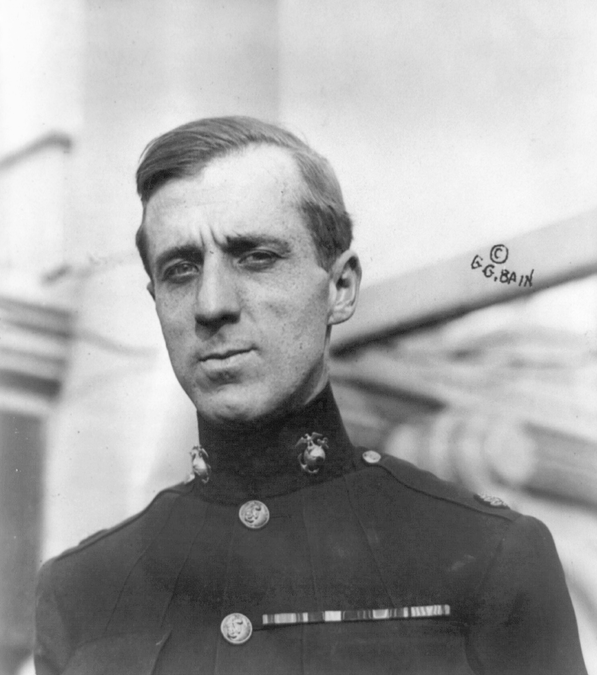In the depths of the Great Depression, as millions of Americans struggled to survive, a group of desperate men—the very soldiers who had fought and bled for their country—marched on Washington, D.C. They were the Bonus Army, World War I veterans demanding early payment of their promised military bonuses. Their cause was just, their demands reasonable. But rather than receiving justice, they were met with bayonets, tear gas, and fire. Standing alongside them, in defiance of the political and military establishment, was an unlikely champion: Major General Smedley Butler.
The Bonus Army: Betrayed by the Government
The roots of the Bonus Army’s struggle lay in a promise made by Congress in 1924. The Adjusted Compensation Act granted World War I veterans a bonus for their service, payable in 1945. But by 1932, with the Great Depression ravaging the country, many veterans were jobless, homeless, and starving. Their demand was simple: give us what we are owed now, when we need it most.
Over 43,000 veterans and their families descended upon Washington, setting up encampments near the Capitol in a peaceful protest. They had no intention of leaving until their voices were heard. But instead of compassion, President Herbert Hoover saw them as a threat. On July 28, 1932, Hoover ordered the military—led by General Douglas MacArthur, Major Dwight D. Eisenhower, and George S. Patton—to evict them by force.
What followed was a national disgrace. Troops armed with bayonets and tear gas attacked their fellow countrymen, driving them out of their makeshift homes. The encampments were set ablaze, and at least two veterans were killed. Hundreds were injured in the brutal crackdown, a chilling reminder that the government was more willing to protect wealth and power than honor those who had defended it.
The Bonus Army faced brutal repression in 1932, but their fight was not in vain. After their eviction by the military under Hoover, many veterans returned home empty-handed, but their movement sparked national outrage and ultimately led to victory four years later.
Smedley Butler: A General for the People
While the political elite turned their backs on the Bonus Army, Smedley Butler stood with them. A retired Marine Corps general and two-time Medal of Honor recipient, Butler had spent his career serving the very men who now found themselves abandoned. When he visited the veterans in their encampments, he praised their courage and urged them to continue their peaceful fight.
Butler denounced the government’s betrayal, warning that the real enemies of democracy were not the desperate veterans but the corporate and political elites who used soldiers as pawns, then discarded them when they were no longer useful. He was one of the few high-ranking military figures willing to speak truth to power—and it made him a threat to those who sought to use the military for their own gain.
The Business Plot: An Attempted Fascist Coup
Butler’s defiance of the government’s treatment of the Bonus Army was not forgotten. Just a year later, in 1933, he was approached by a secretive cabal of powerful businessmen and bankers with a shocking proposition: lead a military coup to overthrow President Franklin D. Roosevelt.
This conspiracy, known as the Business Plot, aimed to install a fascist-style regime in the United States—one that would crush labor movements, dismantle the New Deal, and place control of the government firmly in the hands of corporate elites. Butler was the perfect choice for the plotters: he was respected by the military, beloved by veterans, and seen as a man who could rally public support.
But Butler was no pawn for the oligarchs. Rather than accept their offer, he exposed the plot to Congress. His testimony before the McCormack-Dickstein Committee confirmed that powerful industrialists—including figures linked to J.P. Morgan, DuPont, and the American Liberty League—had planned a fascist coup against Roosevelt. Though Congress verified that Butler’s accusations were credible, no one was prosecuted. The plot was swept under the rug, a testament to the untouchable power of the corporate elite.
Where Are Today’s Smedley Butlers?
Smedley Butler was a soldier who saw the truth: that war, and the machinery of government, was being used not to defend democracy, but to serve the interests of the wealthy elite. He called war a racket, one that enriched the powerful while using ordinary people as expendable resources.
Today, we face a new war—not one fought with bullets and bombs, but with disinformation, corporate greed, and political corruption. Billionaires like Elon Musk and Donald Trump are openly aligning with authoritarian interests, using their wealth and influence to dismantle democracy from within. The self-coup we are witnessing—through voter suppression, judicial takeovers, and corporate control of information—is no less dangerous than the coup Butler thwarted.
So where are the Butlers of today? Who among our military, legal, and political leaders will stand up to the corporate oligarchy and defend the people rather than the powerful?
We don’t need another war hero—we need whistleblowers, organizers, and leaders with the courage to speak out against the modern-day Business Plot unfolding before our eyes. The fight is not coming; it is here. And if no one rises to meet it, we will find ourselves—like the Bonus Army—standing amid the ruins of what was once promised to us.
We need your help. While Geddry is a volunteer effort there are still costs to providing pro-democracy content to Coos County. Your donation will help cover printing costs, web hosting fees, and of course we need to raise money for our noncommercial community radio station to cover the costs of equipment.
Please make your tax deductible donation here because we can’t do this alone.

